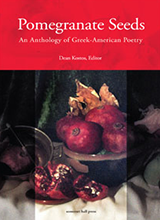Dean Kostos, Editor – Pomegranate Seeds: An Anthology of Greek-American Poetry. Reviewed by Rosemary Cappello.
(Philadelphia Poets, June 2009.)
Like the pomegranate, a fruit that is composed of ruby-red seeds – unusual seeds of a consistency that foretells their destiny – this anthology is made up of innumerable poems that have sprung from the same origin. Each seed is like a fingerprint, no two exactly alike, each a distinct and individual piece; yet, a similarity exists inasmuch as each of the 49 poets represented here were either born in Greece or born elsewhere of Greek forebears; thus Greek culture informs their work.
Take, for example, Manya Coulentianos Bean’s poem, “Le Mot Juste at the Philadelphia Museum of Art.” Early in the piece, she refers to a Philadelphian visiting the museum, and cites her impressions of art and artists. In the final stanza, referring to the visitor as well as to the statue of Diana by Augustus Saint-Gaudens that is a centerpiece of the museum, she writes:
She’ll live on the museum steps,
Drink, sleep, dream,
Awaken to the Oracle of Delphi
Next to her beautiful brother,
As day by day Artemis
Springs into her thought,
Poised, her bow taut,
On the hunt for idea, word,
The right word, the timely action
Clearly, the Philadelphian compares herself as poet to her hunter forebear of ancient Greece, calling her by the Greek name of Artemis rather than the Roman, Diana.
Much of the poetry in this anthology has to do with art; some of ancient artifacts, and others from more recent centuries. An example of the ancient is found in Lili Bita’s poem, “Kouros,” where homage is paid to a kouros statue which, while obviously symbolic of Greece, actually stands (or is prone, as in the particular kouros Lili writes of here) for all humankind.
As for more recent art, Constantine Contogenis, in his poem “There Are No Ploughs in Ikaria,” starts by saying that Breughel, in his painting of Icarus, is wrong in his rendering of the Daedalus myth. He continues that Auden, in his poem of praise for the painting, follows that error. Breughel, in transporting the myth to his country, brings to mind the oft-quoted phrase, “Here, we are all Greeks.” That line was spoken to me by a Neapolitan when I was lost in Naples, Italy and he guided me to the Archeological Museum. I note that “We are all Greeks” is quoted in the poem “Defenseless City,” by Yiorgos Chouliaris, as a line spoken by the poet Shelley, although the mention is made with overtones that such is not true. As is the way with complicated statements, it is true, and yet it is not. Contogenis, then, rightfully calls attention to the inaccuracies of the famous painting and poem; yet, one can’t deny the poignancy, and the revisiting of ancient Greece, that is brought about by both.
In ethnic collections, one usually finds poems that relate stories of massacres inflicted by conquerors. In “That Woman Said No,” it is the Turks who are invading Greece; in a Turkish collection of poems, it is yet another invader causing death and destruction to Turkey. Here, the poet is historian, recounting past events and brining them to life in a way that prose cannot.
The poem “That Woman Said No,” by Eleni Fourtouni, recounts the tale of the women of Souli, who danced to their deaths rather than be captured by the Turks. The poet speaks for one woman who might have protested and asks the question, “Wasn’t death/ a foe harsher than the Turk?” That question remains unanswered, as the speaker views the deaths of women and children: “I was alone with the gorge/ and the terrifying smell of death.” It is nighttime, and the poem ends with her waiting for the “…morning star,/ and for the amber mist of dawn.” This poem, a brief two and a half pages long with lines that are mostly short, is, nevertheless, operatic in scope because of the gravity of the situation combined with the emotion of the woman.
If I were to compare the poetry of Greek-Americans with that of Italian-Americans, I’d say that the former are more in touch with every aspect of the antiquity of their country. The latter also pay homage to their ancestral land, but they do not nod as much in the direction of overall antiquity as they do toward the particular section of Italy their people came from, and toward the people themselves.
The many poems in this issue that do speak of people remind me very much of Italian-American poetry. For example, Dan Georgakas, in his poem “Greek Widows,” asks us to “Consider these Greek widows of America/ completing blackclad lives/ in the rented rooms of the old neighborhood.” They are alone, for “…their children sleep in the wedlock/ so eagerly sought for them,” and because they had been “matched to older men” whom they outlived. They now “endure November graveside days/ sipping the last of the homemade wine.” The biography of a widow, summed up in an eleven-line poem, reminds me of how, because of the conciseness required of poetry, a poem can contain a novel. The Greek widow of this poem is almost identical to the black-clad Italian widow, living in America, and yes, drinking the same wine.
Another “person” poem is “Coins,” by Neil Carpathios, a biography of his father which is a full-length film in two pages, about a man whose full and hearty life included teaching his son anatomy by way of The Visible Man; who “died at seveny-one and gave me the ring/his mother gave him/ before coming to America,/ Alexander the Great/ carved in gold/ I wear on my finger.”
Symbolically, the poets in this anthology all wear that ring on their fingers. The torch first lit by the ancient poets and dramatists of Greece has been handed to them, and they are skillfully and admirably running with it.

